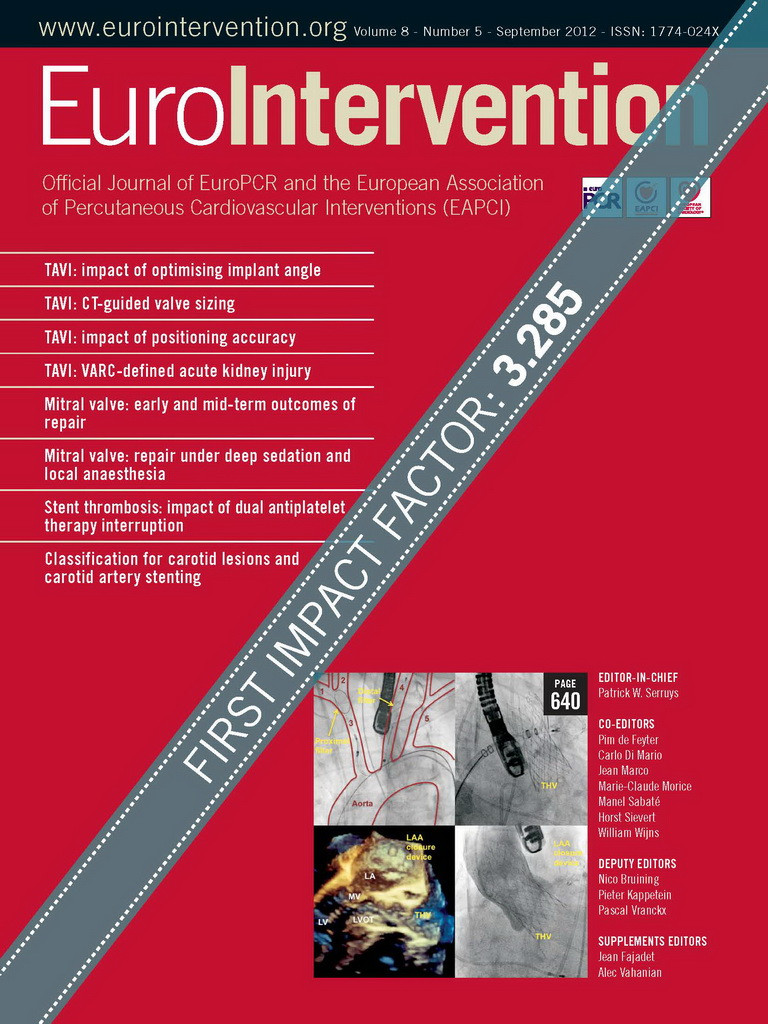We are writing this column soon after the European Society of Cardiology (ESC) meeting a few weeks ago in Munich still inspired by the excitement of this very successful scientific congress. The amount of new data presented and critical information introduced and exchanged was enormous. For those of you who were present at this year’s congress, I don’t need to tell you how increasingly comprehensive these scientific sessions have become. For those of you who, like myself, have had the pleasure of witnessing the growth of the ESC over the years, we look back with wonder at its earlier and less dominant origins to where it stands today as the pre-eminent international meeting in cardiology.
One key aspect to the growth of the ESC over the last decade is its responsiveness to the speciality associations and national societies that make it up. More and more, we increasingly participate in the construction of the meeting itself and this year was a banner year for the EAPCI. We are proud of our evolving and dynamic commitment to this development, and we see the imprint of our association throughout the various sessions concerning interventional cardiology. Our textbook, the PCR-EAPCI Percutaneous Interventional Cardiovascular Medicine Textbook, was very well received and welcomed as a central part of the ESC eLearning platform, something we discussed in this column last month. The special EuroIntervention supplement on the work of the Stent for Life Initiative was also published to coincide with the ESC Congress and offers an in-depth look at the treatment of ST-elevation myocardial infarction (STEMI) throughout Europe and abroad through the work of this important initiative. The special EuroIntervention supplement on the work of the Stent for Life Initiative was also published to coincide with the ESC, offering an in-depth look at the treatment of ST-elevation myocardial infarction (STEMI) throughout Europe and abroad through the work of this important initiative. The EAPCI organised and presented excellent interventional cardiology sessions touching on coronary artery disease, structural heart disease, peripheral vascular disease and renal denervation for resistant hypertension and heart failure. Specifically concerning structural heart disease, a good overview of percutaneous interventions for severe aortic stenosis (TAVI) was presented and the latest results for this technique were discussed. Future possibilities were discussed as well, with the latest developments in the pipeline presented to the ESC attendees.
While the EAPCI actively participated in the ESC, taking the lead in the creation and organisation of a dozen sessions, for interventional cardiologists what is presented at a congress such as this one can only be seen as the opportunity to “whet your appetite” for the more specialised sessions that we create and participate in throughout the year. The ESC is without doubt excellent with an exchange of high-quality information and education, still the annual ESC congress is targeted to a wide range of healthcare providers and general cardiologists, whereas we as interventional cardiologists need more targeted, specific and dedicated meetings where we go into depth on the cutting edge subjects and techniques that we use, or will be using in the future.
PCR London Valves taking place from the 30th of September until the 2nd of October is just such an opportunity for the community of interventionalists to discuss, learn and have a “hands-on” course dedicated to valves. For the first time this year, PCR London Valves will be an official course of the EAPCI, led by its two great Course Directors, Martyn Thomas and Stephan Windecker. PCR London Valves will allow us to focus –in detail– on the data, on the techniques, on the different issues concerning this rapidly evolving speciality, delving further into the current challenging work in structural heart disease.
It is of great importance that we use the word “Course”, because this is not a meeting or symposium in the traditional sense of the word, but a “Course” in the great tradition of EuroPCR, a tradition that the EAPCI adheres to as a member –and participant– in the PCR Family. This is a course that is built, “by and for you”. This tradition underlines the importance of the practical and clinically driven in terms of therapy and treatment, and will focus on interventional treatment for valves, whether it is the now well-known TAVI procedures or mitral valve interventions.
What makes a course like London Valves so very special, and why the EAPCI has chosen it as an official programme of our association, is the deep commitment to education in an extremely interactive setting using live demonstrations, and information presenting the very latest devices and developments. Particular aspects of the Course, such as “Learning the Techniques” are exemplary. There will also be discussions on health economics and, for the first time this year, abstract sessions will be featured as well.
A course of this magnitude and depth cannot be constructed alone. Building on our experience and success with the “Heart Team” concept, we also acknowledge the collaboration of the European Association for Cardio-Thoracic Surgery (EACTS), which plays a vital role in the ongoing success of PCR London Valves.
London PCR Valves has been conceived to follow in the same spirit as EuroPCR and the PCR Family, and is clearly the future for all of the various courses we organise or participate in throughout the world: Gulf PCR, Dubai in December; Asia PCR Singapore Live in January and EuroPCR in May.
I hope to see you all at PCR London Valves, and hope that you will be able to join me and our many colleagues at this exciting new venue, the Queen Elizabeth II Conference Centre in London.

